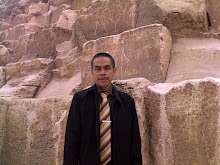THE URGENCY OF HARMONY
AMONGST THE DIFFERENT BELIEVERS
Abd A‘la
Friction, even disagreement triggering violence among the different religious followers, especially Muslims-Christians, likely would still emerge in Indonesia and all over the world. The phenomenon around us shows that the essential harmony between them is still limited to the little elements in the community. For the rest, the harmony appeared more as a "cold war" or merely a formality not touching the essence of harmony itself. Beside, the harmony within the people shows a pragmatic nuance not based on solid theological values.
In such case, the provocation carried out against a certain group of people, or only a little friction amongst those different religions would simply ignite disagreement and hostility that could end with anarchist and other similar actions.
Mistrust amongst Different Believers
The nuance of harmony closing with unclearness to a certain degree lays on suspicion and mistrust on the different religious communities. Sardar states (2003), the suspicion of the Christians against Muslims in general is in shape of the theological distrust and the humanitarian distrust. While the suspicion of Muslims against Christians looks in the theological distrust, the experiential distrust, and the academic distrust.
Theological issue has become the place of suspicion amongst Muslims and Christians since each has a different faith, or even conflicting with one another. For instance, on the one hand, Muslims are sure that cult of Jesus, which the Christians believe is not authentic teaching. On the other hand, (some) Christians blame Islamic teaching is no more than just imitation of the Jewish law. They also argue that Islam is a religion has lost its universal values of humanity.
As far as each other put the differences on enlighten dialogue, it would not become problem for harmonious life. These differences will become serious problem when they make them accusation one to another causing hostility and alike amongst them.
The problems are going to become worse since some Muslims are burden with the historical experience they have been passing. Imperialism and colonialism in the past, which was an interrelated –directly or indirectly –with Christianity urge them in distorted imagination to bond Christian teachings with the "neo-colonialism" and such.
In accordance with that, some Muslims view simply the Islamic studies from the West, especially orientalism, no more than an effort to discriminate Islam and Muslims. This assumption is still sticky in mind of many Muslims up to now.
Based on those academic distrust, and experiential distrust, some Muslims nearly make Christianity identical with the West in which they belief that the two elements cannot be separated with dehumanistic popular western cultures.
Those suspicions and mistrust bonding to each of the different believers above actually is one of major obstacles in building a genuine substantive harmony. This situation in turn is not favorable to create sincere tolerance, particularly to build a strong perpetual cooperation between them.
Sincerity and the Dialogue
Responding the contemporary phenomenon, inter-religious dialogue and other similar programs growing fast in the present actually can be a pillar to build strong cooperation amidst those different believers. Ironically, besides the spectrum coverage of the dialogue is very limited so far, the roots of dialogue are in risk to invite suspicion. Based on his own experience, Sardar urges, the dialogue developing hitherto is more a product of fear (from the some Christian West), which they made up against Islam. It tends more simply to repress Muslims, and not to place on efforts to develop mutual understanding and mutual respect. Thus, sincerity to do dialogue is difficult to develop.
Moreover, the themes, even, do not refer to the real problems which humanity face. Furthermore, the discussion once in while only circle around the transcendental theological issues or just an effort to force the uniform views that is not possible to turn out to be in the sameness.
It is truly important that they have to discuss the theological issues in order to find the values of truth, from which they have to transform to build a strong cooperation for the sake of human being interests all over the world. Nevertheless, they must recognize the pluralistic world and human being potential conflict. Therefore, the problem is not to impose uniformity, but to widen sincere and wise attitudes being able to accept the pluralistic reality placed in the framework of a sustainable dialogue.
In this framework, the dialogue –borrowing phrase from Zebidi (1997) –always demand the respect of each other, and the will to listen one to another from which the different believers have to develop a dialogue not to be burdened by such suspicion, prejudice, and motives other than for the sake of collective interests.
At the same time, they need to expand contextual and critical dialogical issues currently challenging humankind and the world, and related with the broad public wellbeing. Thus, strategic issues, such as poverty, the moral and environmental degradation, and similar issues they should make as a priority agenda. Last but not lest, another issue they should seriously discuss is to formulate the agenda into the praxis©.







1 comment:
Happy New Year!
I am browsing the Net and stumbled upon your nice looking and informative blog. Keep up the good work.
multibrand.blogspot.com
Post a Comment